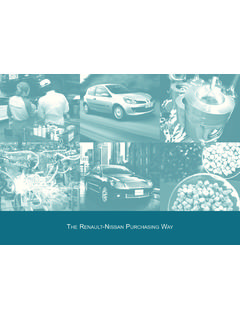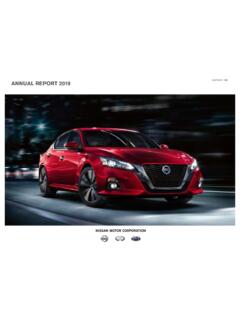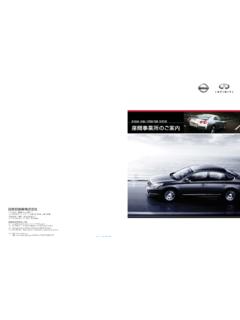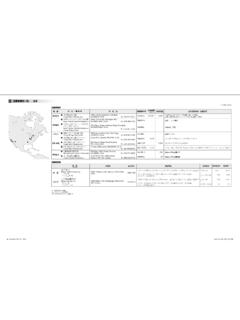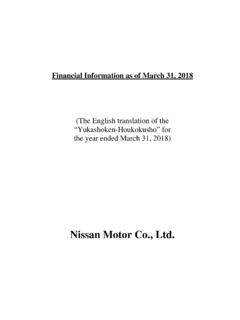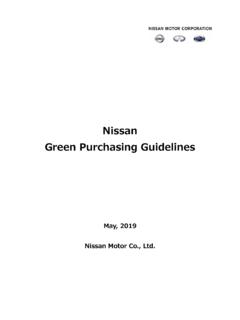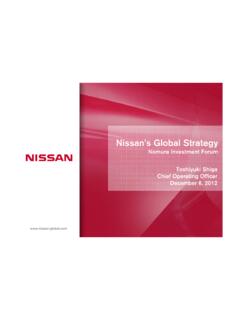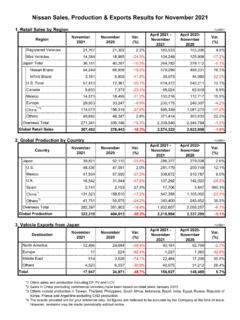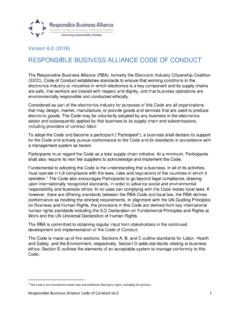Transcription of Renault-Nissan CSR Guidelines for Suppliers
1 1 Renault-Nissan Corporate Social Responsibility Guidelines for Suppliers December, 2015 Renault Nissan Motor Co.,Ltd. Renault-Nissan PURCHASING ORGANIZATION . 2 Contents 3 1. Renault-Nissan Purchasing Way .. 4 2. CSR Guidelines for Suppliers .. 5 Overview and Use of These Guidelines .. 5 CSR Areas and Items .. 5 Compliance .. 5 Safety and Quality .. 6 Human Rights and Labor .. 6 Environment .. 7 Information Disclosure .. 7 3. Our call to Suppliers .. 8 Ensure CSR compliance .. 8 Legal and regulatory compliance .. 8 CSR organization and governance .. 8 Supply chain promulgation .. 8 Supplier CSR confirmation .. 8 Commitment and contracting .. 8 Assessment .. 8 Actions in the event of non-compliance .. 9 SUPPLIER COMMITMENT .. 10 3 Introduction Since 2006 the purchasing departments of Renault and Nissan have been sharing common values and processes with a worldwide network of Suppliers through the Renault-Nissan Purchasing Way.
2 2010 saw the roll-out of the first edition of our joint Renault-Nissan Corporate Social Responsibility Guidelines for Suppliers which underline the role of Suppliers as key partners in our respective Corporate Social Responsibility (CSR) policies. You are direct contributors to our social and environmental performance, guardians of your own supply chain, but also major players in the transformation of the automobile industry and society as a whole. Over and above compliance with the evolving regulatory and normative framework that is driving contractors to carry out and report on due diligence in their supply chain, the reissue of this document aims to reaffirm and to reinforce our commitment to furthering the positive impact that Renault, Nissan and our Suppliers have on society as well as reducing or limiting the negative impact. Insofar as we are asking you, our Suppliers , to accompany us in this process and to relay these Guidelines in your own business relationships, we are striving for progress beyond our direct sphere of influence.
3 The diversification of our business and expansion into new territories across the globe, coupled with society s growing and necessary focus on social and environmental issues have important repercussions on how we operate. They provide us with both challenges that we must overcome and opportunities that we must seize and then anchor in our processes. It is against this background that we have updated the Renault-Nissan CSR Guidelines for Suppliers to ensure that our Suppliers review their corporate activities from a CSR perspective and further strengthen their management systems. We hope that this booklet will be a practical guide for you, our Suppliers , on our approach to CSR and that it will help you to enhance your own CSR management. We also encourage you to disseminate and promote the areas covered in this booklet through your own supply chain. Thank you for your understanding and cooperation as we continue, based on an ongoing relationship of respect, trust and transparency, to pursue sustainable, mutually profitable growth by working together to further improve CSR management and performance throughout the entire supply chain.
4 Renault-Nissan Purchasing Organization 4 1. Renault-Nissan Purchasing Way Renault and Nissan aim to achieve sustainable, profitable growth by developing a relationship with Suppliers based on mutual trust and benefit. Through a productive dialogue and capitalization on ideas and recommendations identified with Suppliers on a level-playing field, we are able to integrate industry best practice and endeavor to stay ahead of the fierce competition within the automobile sector. Renault and Nissan purchasing divisions operate together using a fair and transparent process to select Suppliers , providing a wide range of opportunities for companies to do business with us, irrespective of their nationality, size or our past business relations. External control of our business practices is ensured through close communication in our day-to-day dealings with Suppliers , as well as the regular exchange of ideas through meetings and surveys.
5 We apply the Renault-Nissan Purchasing Way to maintain the highest standards of impartiality and fairness in all our business transactions. The Renault-Nissan Purchasing Way booklet covers: Scope Values o Trust (Work fairly, impartially and professionally.) o Respect (Honor commitments, liabilities and responsibilities.) o Transparency (Be open, frank and clear.) Supplier Selection - The Principles Supplier Support - Joint optimization through collaboration Supplier Benefit The document can be downloaded here: 5 2. CSR Guidelines for Suppliers Overview and Use of These Guidelines These Guidelines aim to encourage our Suppliers to review their corporate activities from a CSR perspective and to take clear action to further improve their CSR governance and performance where necessary. We have selected 26 specific items from five areas where expectations on supplier performance are especially high in the automobile industry.
6 CSR Areas and Items Compliance Compliance with the law Comply with the laws in all countries and regions. Establish and deploy policies, strategies, codes of conduct, reporting systems, training programs and all other means necessary to ensure thorough, companywide compliance. Compliance with competition laws Comply with competition laws in all countries and regions. Do not engage in practices such as illegal monopolies, improper trade restrictions (cartels, bid rigging, etc.), unfair business practices or abuse of dominant positions. Preventing corruption Strive to forge transparent and fair relations with your Suppliers and make sure political contributions and donations are in accordance with the laws in all countries and regions. Do not accept from or provide Suppliers with gifts, services or hospitality intended to influence a business relationship or induce improper conduct. Managing and safeguarding personal and confidential information Obtain personal and/or confidential information about customers, third parties and employees only through legitimate methods.
7 Rigorously control and protect this information and use it only within the appropriate scope and in accordance with the laws of all countries and regions. Managing exports Undertake appropriate procedures and management of exports of technologies and goods restricted by the laws and regulations of all countries and regions. Protecting intellectual property Protect intellectual property rights owned by or affiliated with your own company. Do not obtain third-party intellectual property by unlawful means nor make improper use of it. Eliminating Japanese anti-social forces based on the Government Guideline and ordinance in Japan All staff members, including executives and employees, should eliminate and prevent any relationship and/or any business transaction with Japanese anti-social forces. This policy shall be clearly shared with all stakeholders and Suppliers . responsible procurement of minerals Require businesses to comply with laws regarding responsible procurement of minerals and to proceed their due diligence for conflict minerals.
8 Indicate whether the minerals included in the materials or component parts, have social contagion pertaining to human rights or environment. If contagion is suspected or confirmed, identify and deploy actions for alternative sourcing or mineral substitution 6 Safety and Quality Providing products and services that meet customer needs Identify customer needs in order to develop and provide socially effective products, in particular products that can be easily used by all of our customers. Provide products that save energy, save resources or limit their environmental impact. Ensuring safety of products and services Produce and provide products and services that meet or exceed the safety laws and regulations set by each country and region. Ensuring quality of products and services Establish and operate company-wide quality assurance mechanisms. Human Rights and Labor Discrimination Do not discriminate in any aspect of employment (recruitment, employment, promotion, wages, dismissal, retirement, assignment of duties, disciplinary measures, etc.)
9 On the basis of race, nationality, gender, religion, disability, age, background or any other legally prohibited reason. Respecting human rights Do not allow any form of harassment in the workplace on the basis of race, nationality, gender, religion, disability, age, background, position in the company, employment status or any other reason. Prohibiting child labor Do not permit the employment of minors who do not meet the legal minimum working age of each country and region and in all cases if minors are below the age of 15, in accordance with Renault-Nissan policy. Prohibiting forced labor Do not practice forced labor. Guarantee that all labor is voluntary and that employees are free to leave their jobs. Remuneration Comply with the laws of each country and region regarding minimum wages, overtime, wage deductions, performance-based pay and other remuneration. Working hours Comply with the laws of each country and region regarding the setting of employees working hours (including overtime) and the granting of scheduled days off and paid annual vacation time.
10 Dialogue and consultation with employees Undertake sincere consultation and dialogue with employees or their representatives. Recognize employees right to associate or not associate based on the laws of each country and region of operation. Ensuring a safe and healthy working environment Make the health and safety of workers the top priority and make every effort to prevent occupational accidents. Details of Renault and Nissan CSR Guidelines for human rights and labor: NISSAN Global Code of Conduct RENAULT Global framework agreement on social, societal and environmental responsibility (2013); Code of ethic and compliance rules. o o 7 Environment Environmental management Comply with current laws and try to anticipate changes or trends in law in each country or region. Build and continuously operate and improve companywide management scheme for pursuing a wide range of environmental activities. Record and report to Renault and/or Nissan, when the information is requested.
